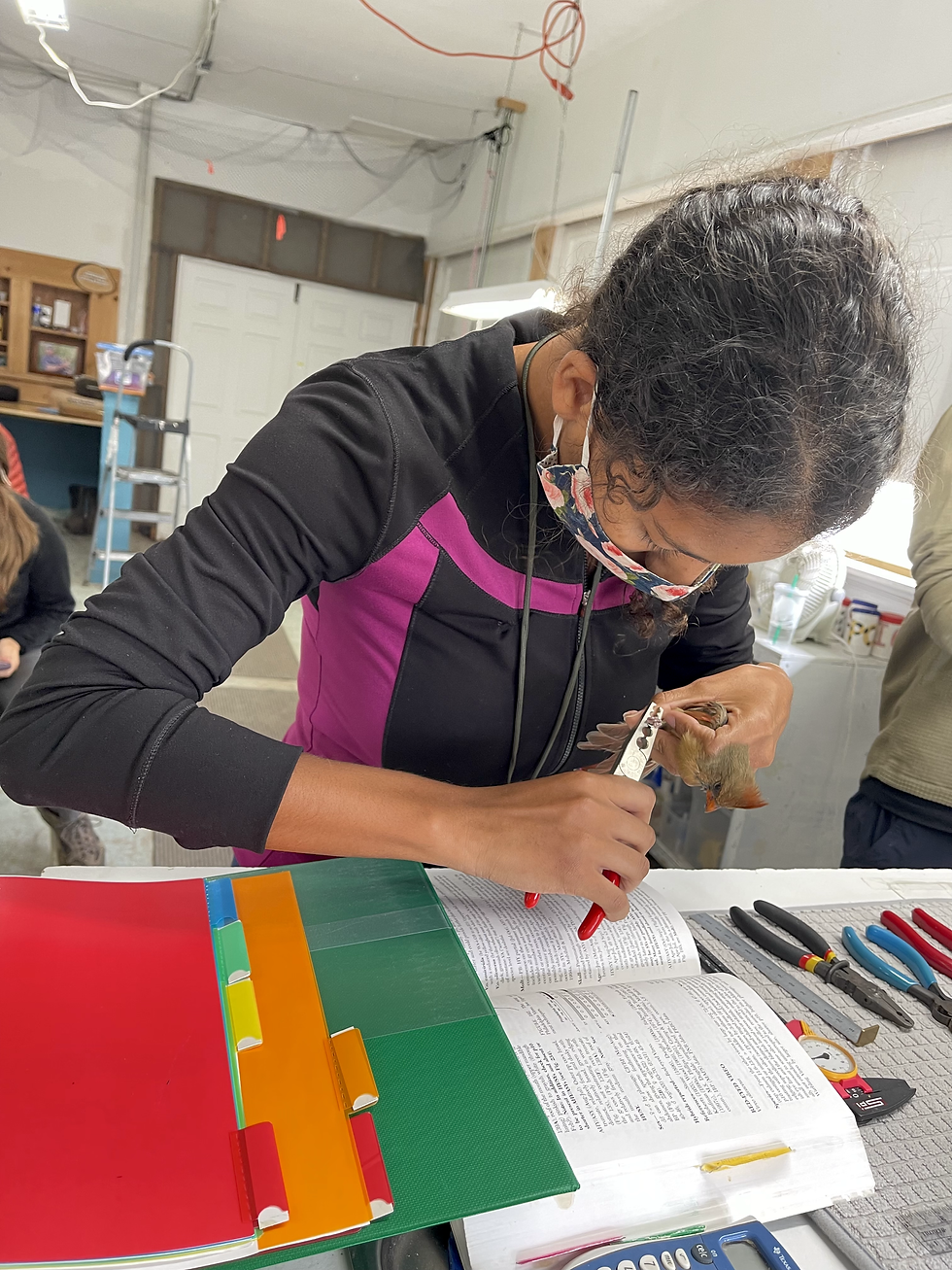
Research Experience
Ph.D. Research
Virginia Tech Department of Biological Sciences
August 2019 - Present
Committee Members: Dr. Jeffrey Walters, Dr. Ignacio Moore,
My research investigates differences in breeding behavior, physiology, and genetics between Puerto Rican Tody populations in rainforest and dry forest environments, and how climate change may shape these populations over time. Understanding how a bird's environment affects their behavior and physiology is crucial for understanding how they may respond to future environmental changes, such as increasing temperatures and drought. Despite being widespread throughout Puerto Rico, the Puerto Rican Tody is an understudied bird and this research will help fill gaps in our knowledge about their natural history and breeding biology across varying habitats.




Bird Banding Training
Braddock Bay Bird Observatory, Hilton, NY
September 2021
Over the course of a week, I banded about 50 birds (including ~20 species). For each bird, I took body measurements, and determined age and sex using the Pyle guide. These data were added to long-term research projects investigating stopover ecology. I also extracted about 60 birds from mist nets and learned how to handle challenging banding situations (injured birds, removing bands, etc.). This training was led by Andrea and Emily Patterson.




Marine Research Program
Boston University Biology Department
September 2017 - December 2017
Advisors: Dr. Ingrid Biedron, Dr. John Finnerty, and Dr. Randi Rotjan
My field work was conducted at Calabash Caye Field Station in Belize and on NOAA research vessel Auk in Stellwagen Bank National Marine Sanctuary (SBNMS) off the coast of Massachusetts. In Belize, I investigated feeding preferences and competition among conch and parrotfishes in seagrass habitats to help inform management efforts. In SBNMS, I conducted seabird surveys to add to NOAA’s long-term seabird monitoring data and used data from 1994-2016 to investigate changes in abundance of seabird families over time.
My lab work was conducted in the Marine Genomics Lab at Boston University. I investigated differential gene expression in response to oxidative stress utilizing the Starlet Sea Anemone, which had been collected from varying environments along the Atlantic coast.




Forest Ecology Technician
Boston University Earth & Environment Department
February 2016 - August 2016
Advisor: Dr. Michael Dietze
From February to May, I worked in the Ecological Forecasting Lab to assist a PhD student in investigating climate change impacts on forest biodiversity. Specifically, we assessed non-structural carbohydrate reserves in trees, as these reserves are thought to be depended upon during periods of environmental stress. From May to August, I conducted field work in Bartlett Experimental Forest, NH and University of Notre Dame Environmental Research Center, WI. I was selected as the field crew leader and collected data on tree and sapling growth, survival and recruitment. This work was part of an NSF funded study called Climate Change Impacts on Forest Biodiversity: Individual Risk to Subcontinental Impact.




Wildlife Technician Intern
U.S. Forest Service, Tongass National Forest, AK
April 2019 - August 2019
Supervisor: Gwen Baluss
My main project involved monitoring Arctic Tern colonies via extensive in-person field observations and remotely monitored cameras. I collected data on behavior, reproductive success, predation, human disturbances, and mortality events. I also assisted with other bird projects such as conducting Northern Goshawk surveys and gull surveys, banding Rufous Hummingbirds, and monitoring Tree Swallow nest boxes. Additionally, through this internship I had the opportunity to work on subsistence fisheries projects, which involved partnering with native communities to set up fish weirs and remotely monitored cameras to keep track of salmon populations.




Tropical Ecology Research Program
Boston University Biology Department
August 2016 - December 2016
Advisor: Dr. Kelly Swing
My field work was conducted in Ecuador in the Galápagos Islands, Andes Mountains, Pacific coast and Amazon Rainforest. I investigated Magnificent Frigatebird foraging behavior, Yellow-spotted River Turtle breeding behavior, and the social impacts of oil in Ecuador among indigenous communities. I also conducted distribution and diversity surveys for birds at Tiputini Biodiversity Station (observing over 100 bird species), fishes in Galápagos and bats across Ecuador. I left Ecuador in awe of its great biodiversity and shocked by all the environmental degradation I saw and heard about from local people. Knowing that all this biodiversity was threatened due to anthropogenic climate change, fossil fuel extraction, and habitat loss motivated me to pursue my graduate research in the tropics and better understand these ecosystems so that I could help protect them.



